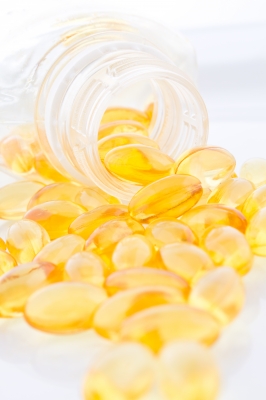What supplements can improve heart health and prehypertension?
 Dr. Britt Burton-Freeman is Director, Center for Nutrition Research, Institute for Food Safety and Health, Illinois Institute of Technology; Associate Research Nutritionist, UC Davis. Her research involves obesity and vascular disease inflammatory and oxidative stress responses. Her research approach includes human and basic science methodology.
Dr. Britt Burton-Freeman is Director, Center for Nutrition Research, Institute for Food Safety and Health, Illinois Institute of Technology; Associate Research Nutritionist, UC Davis. Her research involves obesity and vascular disease inflammatory and oxidative stress responses. Her research approach includes human and basic science methodology.
Dr. Burton-Freeman has shared with us information on supplements and their effectiveness for improving heart health.
Fish oil omega 3 fatty acids
Studies investigating fish oil omega-3 fatty acid supplementation have shown improvements in CVD risk factor reduction. Specifically, fish oil omega-3 fatty acids aid in lowering triglycerides in the blood and help raise HDL. Fish oil omega-3 fatty acids also help to reduce inflammation and are also involved in platelet function, reducing blood clotting time. Hence, too much fish oil can increase the risk of bleeding and hemorrhagic strokes. Elevated blood pressure is another risk factor for CVD. High doses of omega 3 fatty acids have been shown to lower blood pressure in people with hypertension. Consuming > 3 g of fish oil omega 3 fatty acids is advised only under the advice and monitoring of a physician.
Lycopene
Studies investigating lycopene supplementation, a supplement that often is a mixture of extracted carotenoids including lycopene, have shown only modest improvements in some risk factors associated with CVD. Reduced blood pressure in people with stage 1 hypertension is the most supported, whereas hypotensive effects in pre-hypertension remains uncertain. Lycopene is known for its anti-oxidant properties in vitro, however, testing in human clinical trials showed protection from macromolecule damage is relatively weak. Similarly, improved lipid endpoints with lycopene supplementation are weak. Alternatively, consuming tomato products, a rich dietary source of lycopene appears to have modest yet favorable effects on lipid metabolism and protection from DNA damage, yet weak support for blood pressure lowering (Review by Burton-Freeman and Sesso AN, 2014).
Grape seed extract
Clinical trials supplementing with grape seed extracts (GSE) have shown clinically relevant reductions in BP on the order of 4.1% to 8.7% for SBP and 3.4% to 9.0% for DBP. However, not all studies with GSE have produced significant or beneficial changes in blood pressure. This may be due to compositional differences between GSE products, populations being studied or dosing issues. MegaNatural-BP is the only standardized GSE product with consistent data showing blood pressure lowering effects in in at-risk subjects susceptible to cardiovascular disorders.
Garlic
Meta-analyses investigating the effects of garlic supplementation on blood pressure report under-whelming efficacy. The variability in study designs, garlic preparations, and populations appear to hamper interpretation and weak findings.
If you are working to lower blood pressure, access the free ecourse 7 Natural Ways to Lower Blood Pressure at http://lowerbloodpressurewithlisa.com.
All the best,
Lisa Nelson RD
Health Pro for HealthCentral
Image courtesy of artemisphoto / FreeDigitalPhotos.net



